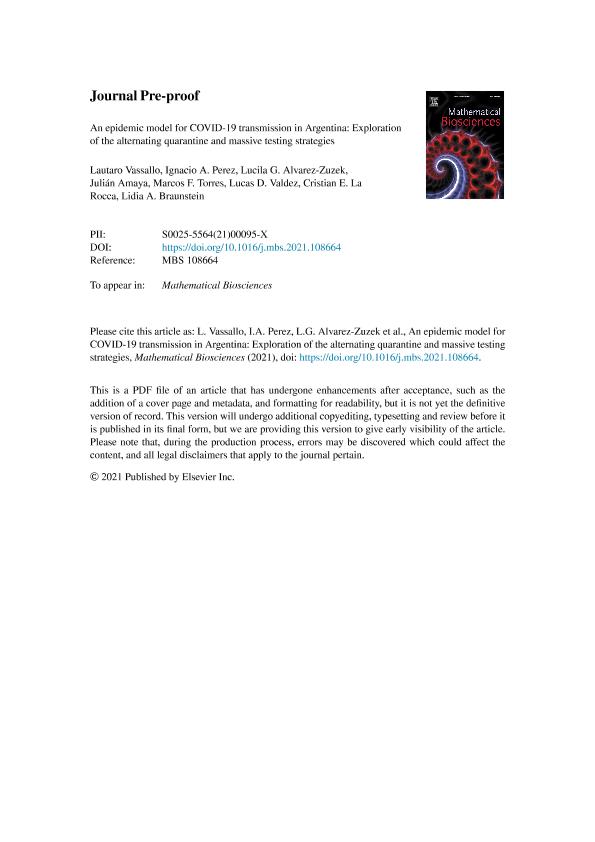Artículo
An epidemic model for COVID-19 transmission in Argentina: Exploration of the alternating quarantine and massive testing strategies
Vassallo, Lautaro ; Pérez, Ignacio Augusto
; Pérez, Ignacio Augusto ; Alvarez Zuzek, Lucila G.; Amaya, Julián; Torres, Marcos F.; Valdez, Lucas Daniel
; Alvarez Zuzek, Lucila G.; Amaya, Julián; Torres, Marcos F.; Valdez, Lucas Daniel ; la Rocca, Cristian Ernesto
; la Rocca, Cristian Ernesto ; Braunstein, Lidia Adriana
; Braunstein, Lidia Adriana
 ; Pérez, Ignacio Augusto
; Pérez, Ignacio Augusto ; Alvarez Zuzek, Lucila G.; Amaya, Julián; Torres, Marcos F.; Valdez, Lucas Daniel
; Alvarez Zuzek, Lucila G.; Amaya, Julián; Torres, Marcos F.; Valdez, Lucas Daniel ; la Rocca, Cristian Ernesto
; la Rocca, Cristian Ernesto ; Braunstein, Lidia Adriana
; Braunstein, Lidia Adriana
Fecha de publicación:
07/2021
Editorial:
Elsevier Science Inc.
Revista:
Mathematical Biosciences
ISSN:
0025-5564
Idioma:
Inglés
Tipo de recurso:
Artículo publicado
Clasificación temática:
Resumen
The COVID-19 pandemic has challenged authorities at different levels of government administration aroundthe globe. When faced with diseases of this severity, it is useful for the authorities to have prediction tools to estimate in advance the impact on the health system as well as the human, material, and economic resources that will be necessary. In this paper, we construct an extended Susceptible?Exposed?Infected?Recovered modelthat incorporates the social structure of Mar del Plata, the 4◦ most inhabited city in Argentina and head ofthe Municipality of General Pueyrredón. Moreover, we consider detailed partitions of infected individualsaccording to the illness severity, as well as data of local health resources, to bring predictions closer to thelocal reality. Tuning the corresponding epidemic parameters for COVID-19, we study an alternating quarantinestrategy: a part of the population can circulate without restrictions at any time, while the rest is equally dividedinto two groups and goes on successive periods of normal activity and lockdown, each one with a durationof days. We also implement a random testing strategy with a threshold over the population. We found that = 7 is a good choice for the quarantine strategy since it reduces the infected population and, conveniently,it suits a weekly schedule. Focusing on the health system, projecting from the situation as of September 30,we foresee a difficulty to avoid saturation of the available ICU, given the extremely low levels of mobility thatwould be required. In the worst case, our model estimates that four thousand deaths would occur, of which30% could be avoided with proper medical attention. Nonetheless, we found that aggressive testing wouldallow an increase in the percentage of people that can circulate without restrictions, and the medical facilitiesto deal with the additional critical patients would be relatively low.
Archivos asociados
Licencia
Identificadores
Colecciones
Articulos(IFIMAR)
Articulos de INST.DE INVESTIGACIONES FISICAS DE MAR DEL PLATA
Articulos de INST.DE INVESTIGACIONES FISICAS DE MAR DEL PLATA
Citación
Vassallo, Lautaro; Pérez, Ignacio Augusto; Alvarez Zuzek, Lucila G.; Amaya, Julián; Torres, Marcos F.; et al.; An epidemic model for COVID-19 transmission in Argentina: Exploration of the alternating quarantine and massive testing strategies; Elsevier Science Inc.; Mathematical Biosciences; 7-2021; 1-35
Compartir
Altmétricas



